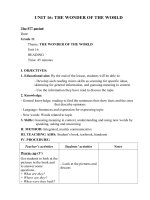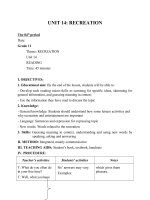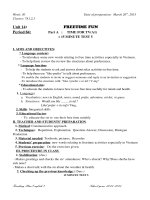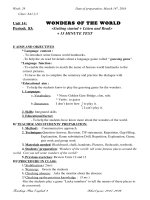Giáo án tiếng Anh 11 unit 14
Bạn đang xem bản rút gọn của tài liệu. Xem và tải ngay bản đầy đủ của tài liệu tại đây (143.38 KB, 21 trang )
UNIT 14: RECREATION
The 84th period
Date:
Grade 11
Theme: RECREATION
Unit 14
READING
Time: 45 minutes
I. OBJECTIVES:
1. Educational aim: By the end of the lesson, students will be able to:
- Develop such reading micro-skills as scanning for specific ideas, skimming for
general information, and guessing meaning in context
- Use the information they have read to discuss the topic
2. Knowledge:
- General knowledge: Students should understand how some leisure activities and
why recreation and entertainment are important
- Language: Sentences and expression for expressing topic
- New words: Words related to the recreation
3. Skills: Guessing meaning in context, understanding and using new words by
speaking, asking and answering
II. METHOD: Integrated, mainly communicative
III. TEACHING AIDS: Student’s book, textbook, handouts
IV. PROCEDURE:
Teacher’s activities
T: What do you often do
in your free time?
T: Well, what you have
Students’ activities
Sts’ answers may vary.
Examples:
Notes
which gives them
pleasure.
mentioned are leisure
activities or forms of
entertainment or
recreation.
S1: I listen to music.
S2: I play sports.
S3: I watch TV.
S4: I read books.
1.
Teacher asks
students to look at the
pictures on page 154
and to answer the
questions:
- What is she doing?
- What are they doing?
S5: I go shopping.
etc.
She is playing the guitar.
1. They are having a
party.
2. They are watching T.V.
3. They are swimming.
4. They are playing
football.
2. T asks sts to answer the
questions:
- Which of the following
leisure activities do you
think Vietnamese people
often do in their spare
time?
- How about British
people?
3. T pre-teaches key
words:
- snooker
- pool and darts
(using
- rugby
pictures)
- cricket
Sts work in pairs and put
a tick in the right box.
Sts’ answers may vary.
- bricklaying
- stock market decision
- glass engraving
T reads or plays the
recording of the reading
passage.
T has sts do Task 1.
Task 1
Sts writes these words
down.
Sts listen to T or to the
T conducts the correction. recording (looking at the
passage).
Sts circle the correct
answer.
Answers
1. A
2. B
3. B
4. A
Task 2.
T conducts the correction.
5. B
6. A
T asks sts to discuss the
question:
Which of the British
leisure activities
mentioned in the passage
Sts read the passage again
and answer the questions.
are also popular in
Vietnam? Which are not?
T has 4 groups write their
answer on the board.
T gives comments.
T assigns homework.
POSTREADING
(10mn)
T conducts the correction.
(work in pairs)
Answers
1. Because without them
people will become dull/
bored.
2. Football and rugby in
winter, and cricket and
athletics in summer.
3. Walking and
swimming.
4. Because this is a new
kind of entertainment
which gives them
pleasure.
T asks sts to discuss the
question:
Which of the British
leisure activities
mentioned in the passage
are also popular in
Vietnam? Which are not?
Sts work in groups.
T has 4 groups write their
answer on the board.
T gives comments.
T assigns homework.
Homework:
Homework (1mn)
- Learn the vocabulary.
- Prepare B. Speaking
The 85th Period
Date:
Grade 11
Theme: RECREATION
Unit 14
SPEAKING
Time: 45 minutes
I. OBJECTIVES:
1. Educational aim: By the end of the lesson, students will be able to Express
agreements and disagreements about entertainment activities. Stating the reasons
for the agreements and disagreements.
2. Knowledge:
- General knowledge: students will be able to Express agreements and
disagreements about entertainment activities.
- Language: making a conversation of a famous person
- New words: words related to the topic
3. Skills: Speaking to Express agreements and disagreements about entertainment
activities.
II. Method: integrated, mainly communicative
III. Teaching aids: textbook, picture of the parts of the body
IV. Procedure:
Teacher’s activities
Students’ activities
Warmer(3’)
Hang-man game
Ask sts to guess a word by using
hang-man game:
AGREEMENT
1 2 3456 7 8 9
Guess the word (the whole class)
Notes
Before you speak (5’)
Scrambled words:
Have sts arrange the words in
correct order to make meaningful
sentences:
Work in pairs to arrange the words in
correct order to make meaningful
sentences.
1. idea / I / good/ don’t / that’s / a /
think.
2. agree / I / you / with / quite
- Give feedback.
Suggested answers:
1. I don’t think that’s a good idea.
2. I quite agree with you.
- Ask sts what is the meaning of
these two expressions and when to
- Answer T’s question
use them
Task 1:
While speaking (25’)
- Have sts arrange the sentences in
task 1 into two groups: A
(Agreement) & D (Disagreement).
- check sts’ answers.
Suggested answers:
A: 1, 3, 4, 6, 7
D: 2, 5
Have sts read these expressions aloud
individually.
Task 2:
- T demonstrates the conversation
with one st.
- Ask sts to practice the conversation
in task 2 about a two-day camping
holiday in groups of 3.
- Check sts performance.
- Have sts underline the expressions
of agreement and disagreement.
Task 3: (groupwork)
- Ask sts to continue the discussion
by using the reasons suggested in
task 3 and expressions of agreement
and disagreement.
- Go around and help students if
necessary.
Task 4: (groupwork)
- Call on some sts to report their
discussion in front of the class.
After speaking (10’)
- Give feedback.
- Have other sts comment on their
performance regarding to content and
pronunciation.
Write a paragraph of 50 words to
describe your camping holiday.
Prepare Part C – Listening.
HOMEWORK: (2’)
The 86th period
Date:
Grade 11
Theme: RECREATION
Unit 14
LISTENING
Time: 45 minutes
I. Objectives:
1. Educational aim: By the end of this lesson, students will be able to develop
such listening micro-skills as listening for specific
information and taking notes while listening
2. Knowledge:
- General knowledge: Listening to pieces of conversation to get information about
the leisure activities on their summer holiday.
- New words: Words related to words related to going camping
3. Skills: Listening for specific information and comprehension questions
II. Method: Intergrated, mainly communicative
III. Teaching aid: Pictures, chalk, cassette tape
IV. Procedures:
Teacher’s activities
Warm- up: (2 mn)
Students’ activities
- Give the activities
- Have Sts give some
entertainment activities.
- T asks Sts some
guiding questions.
- Sts answer the Qs
1. “What do you often do on
your summer holiday.
2. Where do you often go?
- Look at the pictures (work in
Notes
Pre- listening (3 mn)
pairs)
T has Sts look at the picture
1 and 2 and answer the Qs.
Answer the Qs
Picture 1
1. They are student
1. Who are they?
2. They are in the country side
2. Where are they?
3. They are going for a picnic
3. What are they doing?
Picture 2
1. They are tourists
2. They are in a town
3. They are going sightseeing
- Listen carefully
T reads some new words
and asks Sts to repeat.
T gives Sts the meaning of
some new words.
- Read the new words after teacher
- Take notes
While - listening (30 mn)
- Read the sentences (in individual)
Task 1
T has Sts read the sentences,
listen and decide whether
- Listen and answer.
the statements are true or
false.
T asks Sts to listen to three
American students talking
about their summer holiday
(twice).
- Write down the answers.
- Explain!
T has Sts write down the
answers.
- Correct.
T can ask Sts: “Why do you
think it’s true or false?”.
Suggested answers
1/ T
2/ T
T’s feedback
3/ F. He used to
4/ T
5/ F. She doesn’t want to live in
nature and she doesn’t enjoy it
because of the solitude of the
wilderness.
6/ T
- Read the Qs carefully.
Task 2
T has Sts listen again and
answer the Qs (twice)
- Write down the answers.
T asks Sts to read the Qs
before listening
Suggested answers
T has Sts write down the
answers
T’s feedback
- Correct.
1. Riding their dirk bike in the
desert, taking showers in waterfalls
and swimming in lakes and rivers.
2. In sleeping bags or tents.
3. Because more and people are
coming to these places and leave
trash in the forest and take rocks and
plants with them.
4. He think nature is also important
in the world.
5. In cities
Post – listening(8 mn)
T has Sts list three
advantages of having a
camping holiday.
6. Because she can’t put up an
umbrella tent in the wind or make a
fire in the rain or carry a heavy
backpack.
- Discuss (in pairs/groups)
Homework (2 mn)
- Write about your camping
holiday
- Write about your camping holiday
- Prepare part D: Writing
- Prepare part D: Writing
The 87th period
Date:
Grade 11
Theme: RECREATION
Unit 14
WRITING
Time: 45 minutes
I. Objectives:
1. Educational aim: By the end of this lesson, students will be able to write
Students can write about a camping holiday
2. Knowledge:
- General knowledge: Students learn how to organize the camping holiday
- Language: Words used in a form of writing the camping holiday
3. Skills: Writing the camping holiday
II. Method: Interagrated, mainly communicative
III. Teaching aids: Chalk, textbook
IV. Procedures:
Teacher’s activities
Warm up
Students’ activities
Answer
- Yes, we have.
Ask students some questions:
1. Have you ever gone
camping?
2. When and where?
- Last year,…….
- Cooking, playing games, playing
football…
Notes
3. What did you do on camping
holiday?
Today we practice writing about
camping holiday
PRE- WRITING
Ask students to look at the
pictures in the textbook and
answer the questions
- Vo Thi Sau School
1. Which school is it?
- Go camping
2. Where are they going?
3. What are they doing then?
WHILE- WRITING
TASK 1: Last weekend, ,class
11A2 went to Ba Vi for
camping holiday.Below are
some of their activities during
their two –day holiday. Match
them with the correct pictures.
Suggested answer
a. 2
d. 6
g. 1
b. 3
e. 9
h. 7
c. 4
f. 5
i. 8
Ask students to answer the
questions:
1. When and where dit the
students in class 11A2 go
campimg?
2. What time did the bus leave
the school?
3. What did they do first?
Suggested answer
a. 2
d. 6
g. 1
b. 3
e. 9
h. 7
c. 4
f. 5
i. 8
4. What did they do after putting
up the umbrella tent?
5. What time did they leave the
campsite?
Answer the questions and write
on the board
Correct them
POST- WRITING
TASK 2:
Imagine you are one of the
students in class 11A2. Write a
passage about your class s
camping holiday, using the
information in Task 1 and the
questions given
Ask one group to write the
passage on the board and
correct it
Work in group
HOMEWORK:
Write on the board
Tells students to coplete the
writing at home
Prepare for the next period
Language focus
Do homework
The 88th period
Date
Grade 11
Theme: RECREATION
Unit 14
LANGUAGE FOCUS
Time: 45 minutes
I. Objectives:
1. Educational aim: By the end of this lesson, students will be able to:
- Distinguish the sounds / ts / _ / dz / _ / t∫t/ / dzd//
- Pronounce the words and sentences containing these sounds
correctly
- Distinguish the uses of conjunctions: both... and,
not only… but also .either... or, neither… nor
- Use these verb tenses to solve communicative tasks
2. Knowledge:
- General knowledge: Students learn 4 sounds and review some tenses
- New words: Words related to 4 sounds and conjunctions :
3. Skills:
- Pronunciation: /ts/- /dz/- /t∫t/ - /dzd/
- Grammar: Tense revision: the past simple, past progressive and past perfect
II. Method: Intergrated, mainly communicative
III. Teaching aids: textbooks, cassette tape
IV. Procedures:
Teacher’s activities
Warm up (4’)
Write some words on the
board, show students how
Students’ activities
Group work (4 groups)
Notes
to pronounce /ts/, /
dz/, /t∫t /, / dzd / sound
such as: needs, watched,
arranged, sweets, friends,
washed, rents, managed,
sends.
Then introduce 4 sounds
that we are going to
study today
1. Pronunciation(6’)
Explain the way to
pronounce these sounds
listen (1’)
/ts/
listen and repeat (2’’)
sits, eats, meets
whole the class
/dz/
(books opened)
reads, friends, kids
/t∫t/
marched, washed,
brighted, raged, managed
reached
/dzd/
brighted, raged ad first,
read slowly
Ask sts to read the
sentences and pick up the
words containing those
four sounds:
Ask some students to
reread these sentences
Grammar (32’)
• The conjunctions:
Both ….and, either … or,
neither …. nor
Give the situation then
explain:
Ex: Ann was late. Tom
was late
- Both Ann and Tom
were late
Ex: She did not write and
she did not phoned
- She neither wrote nor
phoned
work in pairs then
individual
Follow the instructions of
the teacher
Ask sts to do exercise 1 /
160
Exercise1: Combine the
sentences using:
both… and, neither...
nor , either... or
Walk around to check
and help
Correct the sentences
done on the board
Page 161/ students’ book
Ask sts to give the
conclusion about the
verbs followed by both …
and, neither/ either….
Work in pairs, discuss
nor/or
and do the exercise 1 on
page 160.
* Both + S1 and S 2 +
V (plural)
* Either + S1 + or
+ S2 + V (S2)
Neither... nor
Do on the board
( individual )
Respond
Exercise 2: Change the
sentences into cleft
sentences in the passive
Give the situation and
ask:
Minh: Where is Lan,
Dad?
Dad: Maybe she is in the
kitchen
Follow the instructions of
the teacher, make the
sentence
Minh: What is she doing ,
there?
Work in pairs,
Dad: She is helping her
discuss and do the
mother prepare dinner
exercise 2 on page 162.
Then
- It is her mother who is
being helped prepare
dinner.
Do exercise on the board
Ask sts what we call this
(individual)
sentence
respond
This is Cleft sentence in
the passive
Then ask sts to do
exercise 2/162
Walk around to check and
help
Correct the sentences
done on the board
Ask sts to show the
structure
It is/ was + S + that/
who + be + PP
HOMEWORK (1ms)
- Redo the exercise
- Prepare Test yourself E
Do homework
TEST YOURSELF E
The 89th period
Date:
Grade 11
Theme: TEST YOURSELF E
Time: 45 minutes
I. OBJECTIVES:
1. Educational aim: According to the TEST students can revise all the language
skills and grammatical points which they have studied and used in the three units:
12, 13 and14.
- Students can improve their techniques of doing the simple tests.
2. Knowledge: After this lesson, students will be able to:
- Check themselves their skills in reading, speaking, listening, writing
- Improve their knowledge through the test yourself
- Language: Students can improve their techniques of doing the simple tests
3. Skill: After this lesson, students will be able to:
- Check themselves their skills in reading, speaking, listening, writing
- Improve their knowledge through the test yourself
II. METHOD: Integrated, mainly communicative
III. TEACHING AIDS: Textbook, board, hand-outs, cassette tape and player.
IV. PROCEDURES:
Teacher’s activities
Students’ activities
Warm-up: (5 minutes)
- Greeting
- Greeting
- Ask students something about the test - Answer teacher’s
yourself E
questions
* Have you prepared it at home?
* Have you got any difficulties?
Notes
Test yourself
I. Listening (2.5 points) (10 minutes)
- Ask students to read all the sentences
first
- Look at the book and
listen to the task
- Ask students to listen to the tape
once.
- Understand the task
- Ask students to listen again and
complete the sentences .
- Listen to the tape
- Ask students to listen in the third
time, the work in groups to compare
and discuss the answers with each
others to find the correct answers.
- Keys: In the teacher’s book.
- Read the questions
- Listen again and say the
right sentences.
- Listen and discuss in
groups to find the correct
answers:
II. Reading (2.5 points) (10 minutes)
- Present the task:
- Ask pupils to work in groups to
answers the questions.
- Look at the textbook
and listen to the teacher
- Give the correct answers to the class:
- Work in groups to
discuss about the passage
- Keys: In the teacher’s book
- Finish the task
- Compare their results
with the other groups.
- Write the answers on
the board.
- Listen to the teacher and
correct the answers.
III. Grammar (2.5 points) (8
minutes)
- Present the task:
- Listen to the teacher
a. Ask students to listen and put a tick
in the right box.
- Keys: 1. street, 2. squeeze,
3. meets, 4. managed.
b. Give the correct form of verbs.
- Keys: 1. who, 2. that, 3. (that),
4. who, 5. who, 6. (that)
- Work in groups
- Compare the results
with the other groups
- Show the answers in
front of the class.
- Observe the keys and
correct their answers.
IV. Writing (7 minutes)
- Present the task:
- Call the students to read the suggested
- Students work in groups
sentences in front of the class.
and practise writing.
- Check their writings and help them
correct the mistakes if they’ve made.
- Two students go to the
board and write.
- Give the writings by
reading aloud.
- Read the writing
carefully.
- In groups or in pairs.
Homework (5 minutes)
- Ask students:
+ To study all the lessons again
+ To get ready for the 45 minute- test
in the next period
- Compare the results
with the other groups
- Correct mistakes
- Study all the lessons
again
- Get the knowledge
ready for the coming test









